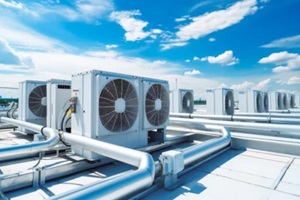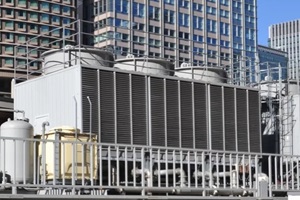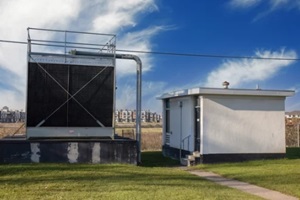 Cooling towers are integral to maintaining a comfortable and safe environment in your building, but they can also be vulnerable to biofilm buildup and corrosion, leading to efficiency loss, increased costs, and potential health risks. Biofilm buildup affects up to 90% of industrial water systems, and can result in energy losses of up to 30% in affected heat exchange equipment.
Cooling towers are integral to maintaining a comfortable and safe environment in your building, but they can also be vulnerable to biofilm buildup and corrosion, leading to efficiency loss, increased costs, and potential health risks. Biofilm buildup affects up to 90% of industrial water systems, and can result in energy losses of up to 30% in affected heat exchange equipment.
In this blog, we’re going to explore some effective strategies and best practices to prevent biofilm formation and control corrosion in your cooling towers.
What is Biofilm?
Biofilm in water cooling systems is a formidable issue, marked by the aggregation of various types of planktonic bacteria that bond to the interior surfaces of the system’s pipes. These bacteria secrete a slime that ultimately encases them.
This slime matrix, composed of DNA, proteins, and polysaccharides, forms a protective barrier around the bacteria, making them highly resistant to biocide treatments—up to 1,000 times more so than in their free-floating planktonic state.
Understanding Biofilm and Corrosion in Cooling Towers
Biofilm formation and corrosion are two significant challenges in the maintenance of cooling towers. Biofilm thrives in the moist environment of cooling towers, creating an insulating layer on surfaces that impairs heat transfer efficiency.
Conversely, corrosion is the deterioration of metal caused by chemical reactions, often accelerated in the presence of water and microorganisms. Collectively, these problems can culminate in diminished efficiency, escalated energy usage, and potentially severe structural damage to the cooling tower.
Strategies for Biofilm Prevention
Preventing biofilm begins with understanding the conditions that promote its growth. Regular cleaning and maintenance can not be overstated. Physically removing debris and sediment from the cooling tower helps minimize the nutrients available for microbial growth.
Chemical treatment is another effective strategy for keeping your building’s cooling tower operating at its absolute best. Biocides such as chlorine or bromine are commonly used to kill or control the growth of biofilms.
Using these chemicals liberally is important to prevent resistance development among microbial populations. Automated dosing systems can provide precise control over the chemical application, ensuring consistent biofilm prevention without overusing chemicals.
Additionally, innovations including ultraviolet light and advanced oxidation processes are gaining popularity as non-chemical alternatives for biofilm control. These methods disrupt the DNA of microorganisms, preventing their reproduction and accumulation.
Corrosion Control Techniques
 Corrosion control in cooling towers involves a combination of material selection, design considerations, and chemical treatment. Using corrosion-resistant materials like stainless steel or fiberglass-reinforced plastic in construction can significantly reduce the risk of corrosion. You can also apply protective coatings and liners to surfaces to make a barrier against corrosive elements.
Corrosion control in cooling towers involves a combination of material selection, design considerations, and chemical treatment. Using corrosion-resistant materials like stainless steel or fiberglass-reinforced plastic in construction can significantly reduce the risk of corrosion. You can also apply protective coatings and liners to surfaces to make a barrier against corrosive elements.
The water’s pH levels, conductivity, and other chemical parameters should be regularly monitored and adjusted to help control erosion. Corrosion inhibitors, such as phosphates, silicates, and molybdates, can be added to the water to form protective films on metal surfaces, reducing the corrosion rate.
Implementing a proper water treatment program, combined with regular monitoring and adjustments based on water quality tests, can significantly extend the life of cooling tower components.
Cooling Tower Design and Operational Considerations
The design and operation of cooling towers can impact the propensity for biofilm and corrosion. Properly designed cooling towers facilitate easier maintenance and cleaning, reducing the likelihood of biofilm buildup.
Removable panels, access points, and similar features for inspection and cleaning are essential. The tower’s location should also be considered, as external factors such as surrounding vegetation or industrial emissions can also contribute to biofilm and corrosion.
Operational practices, such as running the cooling tower at optimal cycles of concentration, can influence biofilm and corrosion rates. Ensuring that the cooling tower is operating within its designed parameters, such as flow rates and temperature ranges, is essential for maintaining its integrity and efficiency.
Monitoring is Key to Longevity
It’s important to implement consistent monitoring and maintenance to ensure cooling towers’ durability and optimal performance. Establishing a rigorous and regular inspection and maintenance regimen is important, which includes visual inspections for signs of biofilm or corrosion, testing water quality, and ensuring that chemical treatment systems are functioning correctly.
Employing cutting-edge technology, like advanced remote monitoring systems and sensors, offers the capability to acquire real-time, precise data on cooling tower performance, enhancing operational insights significantly. Companies can use this information to make proactive adjustments in maintenance and treatment protocols, preventing minor issues from becoming major problems.
Additionally, training personnel in proper maintenance techniques and safety procedures is vital. Knowledgeable staff can quickly identify potential issues and take appropriate action, ensuring that the cooling tower operates safely and efficiently.
Trust Tower Water to Prevent Biofilm
 Biofilm prevention and corrosion control can be a difficult task, not only due to its resistance to traditional treatments, but also because of its ability to impact the lifecycle of your cooling systems.
Biofilm prevention and corrosion control can be a difficult task, not only due to its resistance to traditional treatments, but also because of its ability to impact the lifecycle of your cooling systems.
At Tower Water, we don’t just treat the symptoms; we aim to address the root cause of biofilm and prevent it from building up in your cooling towers. If you’re ready to take control of biofilm in your cooling towers and ensure the optimal performance of your building’s cooling systems, reach out to Tower Water.
Tower Water is your one-stop provider for all water treatment needs. We invite you to experience the Tower Water difference for yourself. If you’re facing specific challenges with bacteria or corrosion, our experts are ready to provide tailored solutions to meet your building’s specific needs. Contact Tower Water today at 1-(212)-518-6475 or online to learn more about exactly why we’re the perfect partner to handle your facility’s needs.
